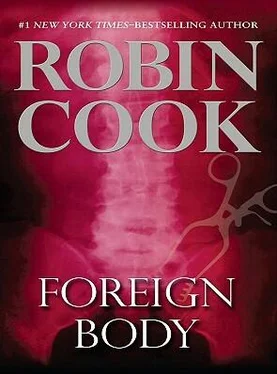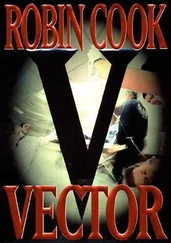Twenty minutes later the formally dressed guest manager who’d shown her to her room on the ninth floor backed out and closed the door behind him. En route to the room he had described the hotel’s facilities and services, which included a fully staffed twenty-four-hour spa/exercise facility with an outdoor Olympic-size pool. Jennifer decided that she was going to make an effort to enjoy her stay at least a little, as Neil had suggested. Briefly thinking about Neil raised her hackles, so she put him out of her mind.
After fastening the safety lock on the door, Jennifer opened her bags, unpacked, and took a long, hot shower. Once out of the shower, she puzzled over what to do. Although she knew she must be exhausted, the excitement of the arrival and the knowledge it was midday in L.A. had given her yet another wind. She knew that if she tried to sleep she’d toss and turn and become frustrated. Instead, she donned one of the luxurious Turkish robes hanging from behind the bathroom door, turned down the comforter in the expansive king-size bed, propped herself up with a clutch of down pillows, and turned on the impressive flat-screen TV with its remote. She had no idea what she would find on the TV, but she didn’t care. The idea was to relax and fool her body into thinking it was time to sleep.
What she did find was a lot more English-speaking channels than she expected, so channel surfing was quite entertaining. When she stumbled on the BBC she almost stopped to actually watch the news. But finding it difficult to concentrate, she moved on and soon found CNN. Surprised to find an American cable network, she watched it for a while, since she didn’t recognize the news anchors. After fifteen minutes had gone by and she was about to move on, the female anchor caught her attention by beginning a piece on medical tourism similar to the one that Jennifer had heard while waiting in the UCLA Medical Center’s surgical lounge. Wondering if her grandmother’s name would again be mentioned, she listened carefully. But her grandmother was not part of the segment. It was another patient’s name, but it was the same hospital, the Queen Victoria.
Mesmerized, Jennifer sat up straighter as the news anchor continued. “The Indian government’s claims that their surgical results are as good or better than those anywhere in the West received another blow last night when a Mr. Herbert Benfatti of Baltimore, Maryland, as we mentioned, passed away with a heart attack slightly after nine p.m. New Delhi time. This tragic result happened after the gentleman had had an uncomplicated knee replacement some twelve hours earlier. Although Mr. Benfatti had had a history of an arrhythmia, he’d been in good health and had even had a normal angiogram in the past month in preparation for his surgery. Our sources tell us that such a death is not an infrequent phenomenon in private Indian hospitals. It’s just that the Indian authorities have managed to keep a lid on such information leaking out. Our sources tell us further that they plan on continuing to report future as well as past deaths so prospective patients can have the information they need to make informed choices of whether or not they want to take such risk merely to save a few dollars. CNN, of course, will bring such information forward the moment it is available. Now let’s turn to...”
Jennifer’s first reaction was sympathy for the Benfatti family and the hope they hadn’t had to hear the tragic news from the TV as she did. It also made her wonder about the hospital. Two unexpected deaths from elective surgery two nights in a row was definitely excessive and, as such, most likely preventable, and thereby more poignant. She also found herself wondering if Mr. Benfatti was married, and if he was whether Mrs. Benfatti was in India, and if so, whether she was staying there at the same hotel. It was Jennifer’s thought that if there was a Mrs. Benfatti it might be nice for Jennifer to convey her sympathies in person if she could marshal the nerve. The last thing Jennifer wanted to do was bother whoever was the next of kin, yet because of her ongoing experience with her grandmother’s death, she thought she could commiserate better than anyone.
October 17, 2007
Wednesday, 8:31 A.M.
New Delhi, India
Jennifer climbed from the black Mercedes sedan that the Queen Victoria Hospital had sent to fetch her from the Amal Palace Hotel. The outdoor temperature was warm but not hot. The anemic morning sun was working hard to penetrate the haze, and it reflected only weakly off the hospital’s mirror-like façade. Jennifer didn’t even need to shelter her eyes as she examined the building. It was five stories tall, and although it was cold and ultramodern, its pleasing combination of copper-colored glass and complementary-colored marble made her admire it to an extent. What made it stand out so sharply was the neighborhood. The ostensibly expensive structure was wedged cheek-to-jowl against the most run-down, white but heavily stained, nondescript concrete commercial block, housing an assortment of small stores selling everything from Pepsi to crude washtubs. The street itself was a mess, potholed and filled with trash of all sorts, along with several cows that were oblivious to the crush of traffic and beeping horns. As Jennifer had expected, the traffic was even worse than it had been the night before. Although there seemed to be fewer of the gaudily painted, beat-up trucks, there were significantly more packed-to-overflowing buses, cycle rickshaws, regular cyclists, pedestrians, and what Jennifer found particularly disturbing, packs of young shoeless children dressed in soiled rags, some deformed, others sick and malnourished, all of whom were dangerously darting between the slow-moving vehicles while begging for coins. As if that wasn’t enough, a few doors down from the hospital on the other side of the street was an empty lot filled with broken pieces of concrete, dirt, rocks, all kinds of rubbish, and even true garbage. Even so, the space was the home of multiple families, their hovels formed by pieces of corrugated metal, cardboard boxes, and scraps of cloth. Adding to the ambience were a number of stray dogs and even a rat.
“I will wait for you here,” said the driver, who’d come around to open the car door for Jennifer. “Do you know how long you will be?”
“I haven’t a clue,” Jennifer responded.
“If I’m not sitting here, please call me on my mobile when you are ready to leave.”
Jennifer agreed to do so, although her attention was focused on the hospital. She didn’t know what to expect and realized her emotions were raw. In place of feeling merely sad about her grandmother’s passing, she was progressively irritated now that she was finally here. Having heard of a second similar death occurring in so many days, she couldn’t help but think the death could have been prevented or at least avoided. She knew it wasn’t a completely rational thought and maybe was more because of her general state of mind, but she felt it anyway. The main problem was that Jennifer was exhausted and more jet-lagged than she had expected she would be. She’d slept poorly if at all.
Then, to make matters worse, her driver had been late, something she was going to learn was an Indian tradition, forcing her to cool her heels in the hotel’s lobby. Fearful that sitting down would cause her to fall asleep, she used the time to inquire about Mrs. Benfatti and whether the woman was staying at the same hotel, which it turned out she was. Jennifer hadn’t necessarily decided to call the woman but wanted to know just the same in case she decided to do so.
Jennifer found the two towering, traditionally costumed, turbaned doormen as imperturbable as the hospital building itself. Each offered a traditional palms-pressed Indian-style greeting before pulling open his respective door, neither spoke nor changed his neutral expression.
Читать дальше












